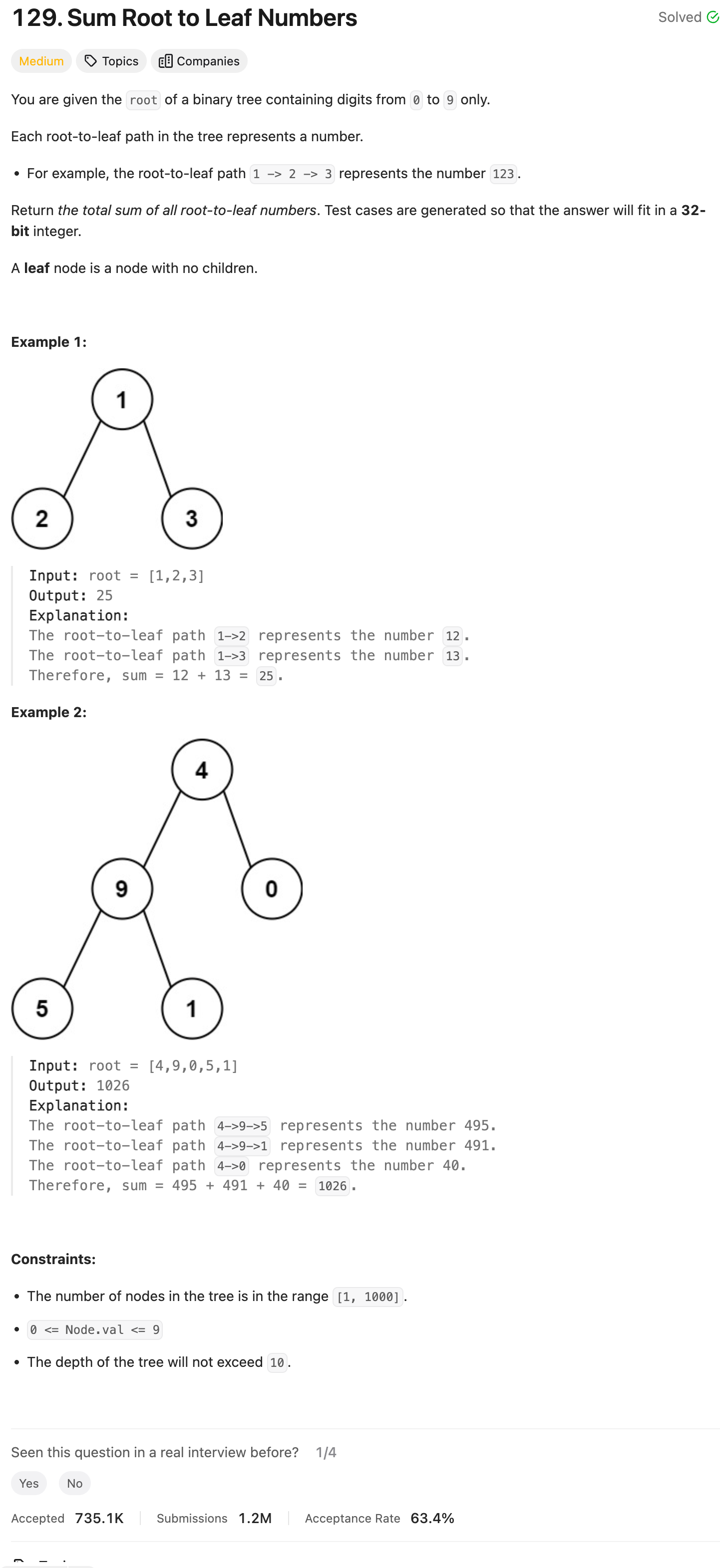Problem of The Day: Sum Root to Leaf Numbers
Problem Statement
Intuition
My first thought is to use depth-first search (DFS) to traverse the binary tree and keep track of the current path sum. As we traverse each node, we can update the current path sum by multiplying it by 10 and adding the value of the current node. When we reach a leaf node (a node with no children), we can add the current path sum to the result. By recursively traversing the tree and updating the current path sum, we can find the sum of all root-to-leaf paths.
Approach
My approach is to define a recursive helper function dfs that takes a node and the current path sum as parameters. Within the dfs function, we’ll update the current path sum by multiplying it by 10 and adding the value of the current node. If the current node is a leaf node, we’ll add the current path sum to the result. Then, we’ll recursively call the dfs function on the left and right child nodes, passing in the updated current path sum. Finally, we’ll return the result.
Complexity
-
Time complexity: O(n), where n is the number of nodes in the binary tree. This is because we visit each node once during the depth-first traversal.
-
Space complexity: O(n), where n is the height of the binary tree in the worst case. This is because the recursive calls consume space on the call stack, and in the worst case, the height of the call stack is equal to the height of the tree.
Code
# Definition for a binary tree node.
# class TreeNode:
# def __init__(self, val=0, left=None, right=None):
# self.val = val
# self.left = left
# self.right = right
class Solution:
def sumNumbers(self, root: Optional[TreeNode]) -> int:
def dfs(node, curr):
nonlocal res
if not node:
return
if not node.left and not node.right:
res += curr * 10 + node.val
return
dfs(node.left, curr * 10 + node.val)
dfs(node.right, curr * 10 + node.val)
res = 0
dfs(root, 0)
return res
Editorial Solution
Approach 1: Iterative Preorder Traversal.
class Solution:
def sumNumbers(self, root: TreeNode):
root_to_leaf = 0
stack = [(root, 0) ]
while stack:
root, curr_number = stack.pop()
if root is not None:
curr_number = curr_number * 10 + root.val
# if it's a leaf, update root-to-leaf sum
if root.left is None and root.right is None:
root_to_leaf += curr_number
else:
stack.append((root.right, curr_number))
stack.append((root.left, curr_number))
return root_to_leaf
Approach 2: Recursive Preorder Traversal.
class Solution:
def sumNumbers(self, root: TreeNode):
def preorder(r, curr_number):
nonlocal root_to_leaf
if r:
curr_number = curr_number * 10 + r.val
# if it's a leaf, update root-to-leaf sum
if not (r.left or r.right):
root_to_leaf += curr_number
preorder(r.left, curr_number)
preorder(r.right, curr_number)
root_to_leaf = 0
preorder(root, 0)
return root_to_leaf
